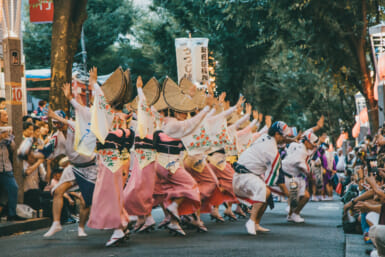by Yurie Horieuchi
It is almost a year since I first started writing this column. In the meantime, there has been a lot of coming and going among the foreign community here, and for the sake of newcomers I have been asked to write again on gift receiving and giving.
So, at the risk of boring faithful (?) readers, I shall again take up some of these aspects of life in Japan.
As most foreigners in this country are aware, gift-giving has been developed into a fine art. Nowhere else in the world is such care taken in the choice, presentation and wrapping of a gift.
Many foreigners working with Japanese associates, or having Japanese friends of clients, have been delighted and somewhat bewildered at receiving expensive and beautiful presents for apparently no reason.
The Japanese love giving gifts, mainly out of friendship, but also as a mild form of bribery.
Should one give a return present? Japanese books of etiquette say “yes.” But this “yes” refers to the rule followed by Japanese, among themselves.
Foreigners are not expected to follow or to know all the intricacies of Japanese etiquette, but they are expected to follow their own rules of politeness. So a “thank-you” note, an occasional invitation to lunch or dinner, and perhaps a special remembrance at Christmas would be appreciated.
Having thus breezily disposed of generalities, I shall follow the order of gift-giving in the life cycle, that is, from birth to death.
Birth Gifts
When a Japanese woman has a baby, she receives gifts of baby clothing from relatives and friends, as well as flowers and congratulatory visits. This is the same the world over, even, I am told on good authority, among the Hottentots.
But the good authority did not mention whether the Hottentots send return gifts in the form of sugar, for example. Traditionally brought up Japanese ladies do.
To digress a moment, it is important to distinguish between the traditionally brought up lady and the post-war “to hell with tradition” type of maiden. The latter is, unfortunately, increasing. But, if television is to be believed, there is an interesting phenomenon: tradition and old customs are seemingly most strictly adhered to by the highest and lowest classes of society in Japan. It is the middle stratum that waives it aside.
The thank-you gift sent after childbirth is traditionally in the form of sugar, and is called uchi-iwai, or family celebration gift. Next time you are in a department store food basement and see boxes of sugar dyed pink or blue, or arranged in the form of roses, carp, etc., you will know what they are for.
This return gift is not, however, expected of the gaijin. A personal note or telephone call of thanks, as you would do in your own country, would be sufficient. But if you do decide to follow the Japanese custom and send thank-you boxes of sugar to Japanese friends, they would be both astounded and delighted at your understanding of their customs and you will be strengthening the pillars of your bridge of friendship.
Presents to a Hospitalized Friend
As in the West, it is the custom to send flowers or baskets of fruit to a hospitalized friend or business associate, and if the relationship warrants it, to make a hospital visit.
After your Japanese friend has returned home and is convalescing, you will probably receive a kaiki-iwai, or “return to health” gift. This is an expression of thanks for your thoughtfulness during his illness.
Wedding Presents
Wedding gifts are entirely a matter of common sense and should be chosen in view of the social and economic situation of the young couple. The average “salary-man” and his bride will probably be settling down in a thimble-sized apartment where they will certainly not do any elaborate entertaining.
If the wedding invitation has come from the groom’s side of the family, the gift should be sent to him, and not to the bride, unless you know her personally.
Gifts bought in department stores and delivered by them are always welcome as they can generally be exchanged if inappropriate.
A gifuto caado (gift certificate) obtained in department stores for set sums of money, are also welcome. They are encased in lovely wooden boxes and wrapped in white paper with the special “wedding” noshi. Ask the store to write your name in sumi, or attach your personal card to it. They will deliver.
Unless the bride or groom is a very close personal friend, it is doubtful if you will receive a letter of thanks for your gift. If you are a member of the wedding reception, your thank-you gift will be given to you as you leave, and that will be the end of that.
Funeral Gifts
The Japanese custom is to make a condolence call to the home as soon as the death of a relative or close friend is learned.
At that time, condolence offerings are made in the form of money, special altar fruit or cakes, or flowers. Incense can also be offered as a gift, but only for Buddhist funerals. If the Shinto rite is followed, the flowers must be white only.
Condolence money, called koden, is wrapped in white paper, tied with black and white strings and presented either at the home or at the entrance to the funeral hall or church. The amount of money offered depends on the relationship, either personal or business, between the donor and the deceased.
At the end of the mourning period—the 35th day for Buddhists and the 50th for Shintoists—presents are sent to each person who gave condolence money or any other form of condolence gift, as well as to helpers and ushers at the funeral.
If no gift has been sent but you have attended the funeral, you will probably receive a thank-you card in a grey bordered envelope when you leave. The envelope sometimes contains also a small package of salt.
Salt is a symbol of purity and is used for purification, such as the driving out of evil spirits. Death is regarded to be evil, and anything connected with death or the dead person is impure and unhappy. Salt therefore is scattered on a person returning from a funeral before he enters the house, thus dispelling all the evil spirits that may have attached themselves to him.








